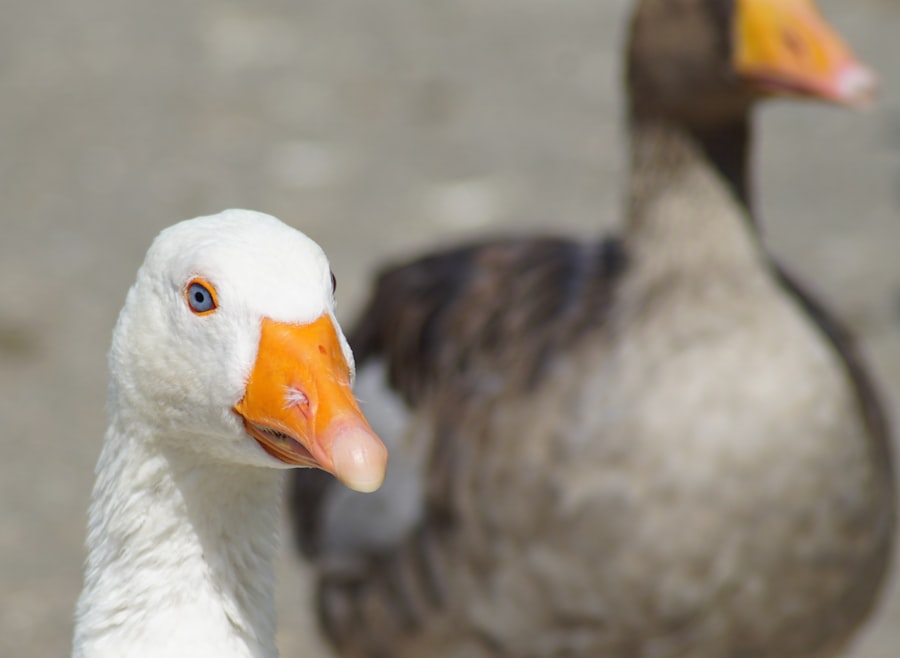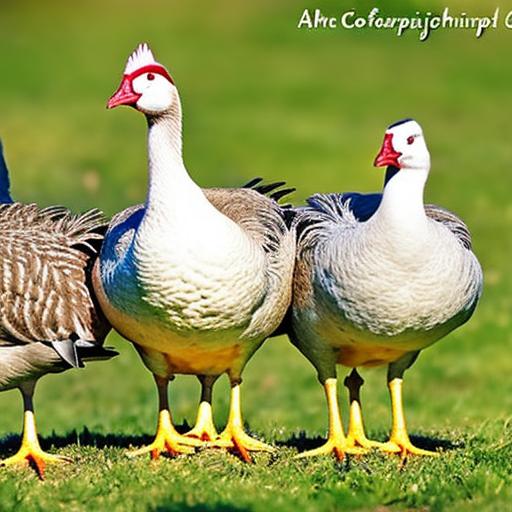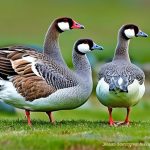Keeping geese and chickens on a homestead can be a rewarding and beneficial endeavor. Not only do these birds provide fresh eggs and meat, but they also offer other advantages such as pest control and fertilizer for gardens. Whether you are a beginner or an experienced homesteader, raising geese and chickens can be a valuable addition to your self-sufficient lifestyle.
Key Takeaways
- Keeping geese and chickens can provide a variety of benefits, including fresh eggs, meat, pest control, and fertilizer.
- Choosing the right breeds for your homestead depends on your specific needs and preferences, such as egg production, meat quality, and climate adaptability.
- Building a coop and enclosure for your birds requires careful consideration of space, ventilation, and predator protection.
- Feeding and watering your flock involves providing a balanced diet and clean water sources, as well as monitoring for signs of illness or disease.
- Health and wellness care for geese and chickens includes regular check-ups, vaccinations, and parasite prevention.
- Egg laying and collection tips include providing nesting boxes, collecting eggs daily, and storing them properly.
- Incubating and hatching your own chicks requires proper temperature and humidity control, as well as monitoring for any developmental issues.
- Raising geese and chickens for meat production involves selecting the right breeds, providing proper nutrition and housing, and humane processing methods.
- Managing flock behavior and social dynamics requires understanding the pecking order and providing enough space and resources for all birds.
- Troubleshooting common problems with your birds includes identifying and treating illnesses, addressing egg-laying issues, and preventing or managing aggressive behavior.
The Benefits of Keeping Geese and Chickens
One of the main benefits of keeping geese and chickens on a homestead is the abundance of fresh eggs they provide. Chickens are known for their prolific egg-laying abilities, with some breeds producing up to 300 eggs per year. Geese, on the other hand, may not lay as many eggs as chickens, but their eggs are larger and have a richer flavor.
In addition to eggs, both geese and chickens offer pest control services. They are natural foragers and will eat insects, slugs, and other pests that may harm your garden or crops. This can help reduce the need for chemical pesticides and keep your plants healthy.
Furthermore, geese and chickens produce nutrient-rich manure that can be used as fertilizer for your garden. Their droppings are high in nitrogen, phosphorus, and potassium, which are essential nutrients for plant growth. By allowing your birds to roam freely in your garden or using their manure in compost, you can improve soil fertility and promote healthy plant growth.
Choosing the Right Breeds for Your Homestead
When choosing breeds for your homestead, it is important to consider factors such as egg production, meat quality, and temperament. If you are primarily interested in egg production, there are several chicken breeds that excel in this area. Some popular choices include Rhode Island Reds, Leghorns, and Australorps. These breeds are known for their high egg production rates and consistent laying throughout the year.
If you are looking to raise geese for meat, the Toulouse and Embden breeds are excellent choices. They are large birds that produce flavorful and tender meat. For chicken meat production, Cornish Cross and Freedom Ranger breeds are commonly used. These breeds grow quickly and have a high meat-to-bone ratio.
Temperament is another important factor to consider when choosing breeds. Some breeds of geese and chickens can be more aggressive or flighty than others. If you have children or other animals on your homestead, it is important to choose breeds that are known for their docile and friendly nature.
Building a Coop and Enclosure for Your Birds
Building a coop and enclosure for your birds is essential to provide them with a safe and comfortable living space. The coop should be well-ventilated, predator-proof, and provide enough space for your birds to move around freely.
When choosing materials for your coop, consider using sturdy materials such as wood or metal. Avoid using materials that can easily be chewed through or damaged by predators. The coop should also have a solid floor to prevent predators from digging underneath.
In addition to the coop, you will also need to provide an outdoor enclosure for your birds to roam during the day. This enclosure should be securely fenced to prevent predators from entering and should have enough space for your birds to graze and forage.
Feeding and Watering Your Flock
Proper nutrition and hydration are essential for the health and well-being of your flock. Chickens and geese require a balanced diet that includes a combination of grains, protein, fruits, vegetables, and calcium.
Commercial poultry feed is readily available and provides a balanced diet for your birds. However, you can also supplement their diet with kitchen scraps, garden produce, and insects they find while foraging.
It is important to provide fresh water at all times for your flock. Chickens and geese need access to clean water for drinking and bathing. Make sure to clean and refill their water containers regularly to prevent the growth of bacteria.
Health and Wellness Care for Geese and Chickens

Keeping your birds healthy is crucial to their overall well-being and productivity. Regular health checks, proper sanitation, and preventative measures can help prevent common health issues.
One of the most common health issues in poultry is parasites. Regularly inspect your birds for signs of external parasites such as mites or lice. If infestations are detected, treat your birds with appropriate medications or natural remedies.
Respiratory infections are another common problem in poultry. Good ventilation in the coop can help prevent the buildup of ammonia and other harmful gases that can cause respiratory issues. Keep the coop clean and dry to minimize the risk of infections.
Egg Laying and Collection Tips
To maximize egg production, it is important to provide your birds with a comfortable and stress-free environment. Make sure they have enough nesting boxes that are clean, dark, and quiet. This will encourage them to lay their eggs in the designated area.
Collecting eggs regularly is important to prevent them from getting dirty or damaged. Eggs should be collected at least once a day, preferably in the morning when they are still fresh. Handle eggs gently to avoid cracking or breaking them.
Incubating and Hatching Your Own Chicks
If you are interested in expanding your flock, incubating and hatching your own chicks can be a rewarding experience. To successfully hatch chicks, you will need an incubator, fertile eggs, and proper temperature and humidity control.
Place the fertile eggs in the incubator and maintain a consistent temperature of around 99-101 degrees Fahrenheit. The humidity should be kept at around 50-55% for the first 18 days, then increased to 65-75% for the final days of incubation.
Monitor the eggs closely and turn them at least three times a day to ensure proper development. After 21 days, the chicks should start hatching. Once they have hatched, transfer them to a brooder box with a heat lamp to keep them warm.
Raising Geese and Chickens for Meat Production
Raising geese and chickens for meat production can provide you with a sustainable source of high-quality protein. When it comes to slaughtering and processing your birds, it is important to do so in a humane and respectful manner.
To slaughter your birds, you can use methods such as neck dislocation or bleeding out. Make sure to research and follow proper techniques to minimize stress and pain for the birds.
After slaughtering, the birds should be properly processed by plucking or skinning, eviscerating, and cleaning. It is important to maintain cleanliness throughout the process to prevent contamination and ensure food safety.
Managing Flock Behavior and Social Dynamics
Managing flock behavior and social dynamics is important to maintain harmony within your flock. When introducing new birds to an existing flock, it is best to do so gradually and in a controlled manner.
Provide separate but adjacent enclosures for the new birds and the existing flock. This will allow them to see and interact with each other without direct contact. After a period of observation, you can gradually introduce them by allowing supervised interactions.
It is normal for some pecking order disputes to occur when new birds are introduced. However, if aggression becomes excessive or prolonged, it may be necessary to separate the birds temporarily or permanently.
Troubleshooting Common Problems with Your Birds
Keeping geese and chickens on a homestead can come with its fair share of challenges. Some common problems that may arise include egg-eating, aggressive behavior, feather picking, or egg binding.
To address egg-eating, make sure your birds have enough space and nesting boxes. Collect eggs regularly to prevent them from becoming a target. If the problem persists, you may need to isolate the culprit or use deterrents such as fake eggs or bitter-tasting substances.
Aggressive behavior can be managed by providing enough space and resources for your birds. If aggression becomes excessive, you may need to separate the aggressive bird or birds from the rest of the flock.
Feather picking can be a sign of stress or boredom. Provide environmental enrichment such as perches, toys, and access to the outdoors to keep your birds entertained and engaged.
Egg binding is a serious condition that occurs when an egg gets stuck in the reproductive tract. If you notice a hen showing signs of distress, such as straining or lethargy, seek veterinary assistance immediately.
Keeping geese and chickens on a homestead can be a fulfilling and beneficial experience. From fresh eggs and meat to pest control and fertilizer, these birds offer numerous advantages. By choosing the right breeds, providing proper housing and nutrition, and taking care of their health and well-being, you can enjoy the many benefits of raising geese and chickens on your homestead. So why not start your own flock today?
If you’re interested in keeping geese and chickens together, you may find this article on Poultry Wizard helpful. It provides valuable insights on how to keep geese and chickens in the same coop, ensuring their safety and well-being. From tips on coop design to feeding recommendations, this article covers everything you need to know. Check it out here: https://poultrywizard.com/keeping-chickens/chicken-coop-10/. Additionally, if you’re wondering whether geese can eat chicken feed, Poultry Wizard has another informative article that answers this question. Find out more at https://poultrywizard.com/keeping-geese/can-geese-eat-chicken-feed/. Lastly, if you’re in need of a reliable chicken coop for your flock, the Producers Pride Sentinel Chicken Coop is worth considering. Learn more about its features and benefits here: https://poultrywizard.com/keeping-chickens/producers-pride-sentinel-chicken-coop/.
FAQs
What are the benefits of keeping geese and chickens?
Keeping geese and chickens can provide a source of fresh eggs and meat, as well as natural pest control for gardens and yards. They also make great pets and can be a fun and educational hobby.
What do geese and chickens need to thrive?
Geese and chickens need a safe and secure coop or shelter to protect them from predators, as well as access to fresh water and food. They also require regular cleaning and maintenance of their living space.
What should I feed my geese and chickens?
Geese and chickens require a balanced diet of grains, protein, and fresh fruits and vegetables. Commercial feed is available at most feed stores, but it’s important to supplement their diet with fresh produce and other treats.
How do I care for geese and chickens in the winter?
During the winter months, geese and chickens need extra protection from the cold. This can be achieved by insulating their coop, providing extra bedding, and ensuring they have access to fresh water that doesn’t freeze.
What are some common health issues that geese and chickens may face?
Geese and chickens can be susceptible to a variety of health issues, including respiratory infections, parasites, and egg-laying problems. It’s important to monitor their behavior and health regularly and seek veterinary care if necessary.
Can geese and chickens live together?
Geese and chickens can live together, but it’s important to introduce them slowly and monitor their behavior. Geese can be protective of their territory and may become aggressive towards chickens if they feel threatened.
Meet Walter, the feathered-friend fanatic of Florida! Nestled in the sunshine state, Walter struts through life with his feathered companions, clucking his way to happiness. With a coop that’s fancier than a five-star hotel, he’s the Don Juan of the chicken world. When he’s not teaching his hens to do the cha-cha, you’ll find him in a heated debate with his prized rooster, Sir Clucks-a-Lot. Walter’s poultry passion is no yolk; he’s the sunny-side-up guy you never knew you needed in your flock of friends!







